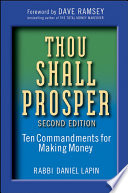

In 'Thou Shall Prosper', Rabbi Daniel Lapin presents a compelling case for the pursuit of wealth as a positive and noble endeavor. He challenges the traditional notion that money is the root of all evil, instead framing ...
Continue readingThe book begins with the fundamental premise that wealth is not inherently evil but rather a blessing that allows individuals to contribute positively to society. The author, Rabbi Daniel Lapin, emphasizes that the pursu...
Continue readingRabbi Lapin highlights the significance of building strong relationships in the pursuit of wealth. He argues that successful individuals often have a vast network of connections that they nurture and maintain. These rela...
Continue readingIn 'Thou Shall Prosper', Rabbi Lapin emphasizes the importance of faith and values in achieving financial success. He argues that a strong moral foundation is crucial for making sound business decisions and fostering a p...
Continue readingRabbi Lapin champions entrepreneurship as a vital path to wealth creation. He argues that entrepreneurs are the driving force behind economic growth and innovation, as they identify needs in the market and develop soluti...
Continue readingA recurring theme in 'Thou Shall Prosper' is the value of hard work. Rabbi Lapin asserts that there are no shortcuts to success and that dedication and effort are essential components of wealth creation. He shares anecdo...
Continue readingRabbi Lapin discusses the necessity of financial literacy as a key component of wealth creation. He argues that understanding financial principles, such as budgeting, investing, and saving, is essential for making inform...
Continue readingThe final key idea in 'Thou Shall Prosper' is the importance of giving back to society. Rabbi Lapin argues that true prosperity is not just about accumulating wealth for oneself but also about using that wealth to make a...
Continue readingThe reading time for Thou Shall Prosper depends on the reader's pace. However, this concise book summary covers the 7 key ideas from Thou Shall Prosper, allowing you to quickly understand the main concepts, insights, and practical applications in around 21 min.
Thou Shall Prosper is definitely worth reading. The book covers essential topics including Wealth is a Blessing, The Importance of Relationships, The Role of Faith and Values, providing practical insights and actionable advice. Whether you read the full book or our concise summary, Thou Shall Prosper delivers valuable knowledge that can help you improve your understanding and apply these concepts in your personal or professional life.
Thou Shall Prosper was written by Rabbi Daniel Lapin.
If you enjoyed Thou Shall Prosper by Rabbi Daniel Lapin and want to explore similar topics or deepen your understanding, we highly recommend these related book summaries:
These books cover related themes, complementary concepts, and will help you build upon the knowledge gained from Thou Shall Prosper. Each of these summaries provides concise insights that can further enhance your understanding and practical application of the ideas presented in Thou Shall Prosper.